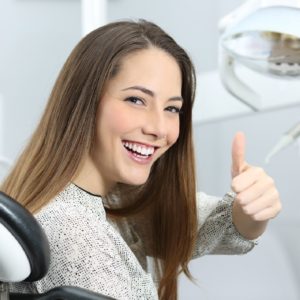
- Use an electric toothbrush
Brushing is the foundation of having healthy teeth. This habit removes the debris and bacteria that live on chewing surfaces on the inner and outer sides of teeth. Most of us grew up using manual toothbrushes (switching them out every three months). Today, we have better choices. If you want to improve your oral hygiene routine, consider switching to an electric toothbrush. These instruments do most of the work for you. All you have to do is ensure you’re brushing for a full two minutes, use gentle pressure, and touch every surface of every tooth using a 45-degree angle between bristles and enamel. The vibration of the toothbrush does the rest.
- Use proper flossing technique
Flossing is flossing, right? Not really. The recommendation to floss once a day is the baseline. To take this to the next level, we’ve got to discuss how to floss so the job gets done. Before brushing, a string of dental floss needs to be passed in between teeth in a way that wraps each tooth a little. This is achieved by creating a C-shape with the floss. Additionally, the floss needs to be moved under the gums. Without reaching this area, there is a good chance that debris and bacteria will not be fully removed. If you have questions about your flossing technique, talk with us! We can recommend products and tools to improve your flossing routine and demonstrate how to do this comfortably and effectively.
- Do not rinse after brushing
It’s important NOT to rinse your mouth after brushing. Toothpaste contains fluoride and, in some cases, additional remineralizing ingredients that you do not want to wash away. You can spit out the extra toothpaste after brushing, but let the helpful, beneficial ingredients in toothpaste continue to work. Take your oral hygiene to the next level by not rinsing to improve your toothpaste’s preventative effects.
Daily habits either hurt or help oral health. Dental visits are also important to a healthy mouth, which is why we do all that we can to make them pleasant and completely painless. If you would like to know more about sedation dentistry, call our NYC office at (212) 974-8737.

